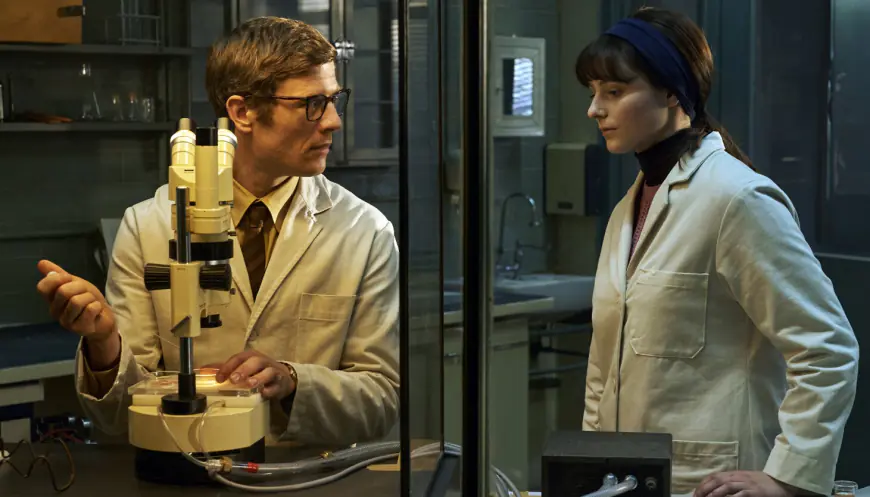'Joy' review: Charming Netflix movie shows the quiet bravery it took to invent IVF
Toward the end of Netflix's “Joy,” the muffled cry of a newborn baby prompts a man and woman in a hospital to embrace out of pure bliss. They aren't the parents, but they had as much to do with the birth as the mom and dad.This charming and winning movie charts the decade-long true story of how the world’s first IVF baby was born in England in 1978 — a 5-pound, 12-ounce girl who paved the way for millions more. It's an upbeat, very English affair, mixing sober discussion of endometriosis with chocolate biscuits.The couple embracing that day were pioneering scientist Robert Edwards and Jean Purdy, a young nurse and embryologist. Together with surgeon Patrick Steptoe, the trio succeeded with in vitro fertilization, a method of treating infertility. Edwards would go on to win the Nobel Prize. 'Joy' Netflix presents a film directed by Ben Taylor and written by Jack Thorne. Running time: 115 minutes. Rated PG-13 (for thematic material brief strong language, some sexual references and surgery images). Streaming now on Netflix. “Joy” has been birthed at a time when science is under threat in America — even IVF — so it's downright inspiring to see plucky, smart scientists working hard to change the world. “What we’re doing, it matters,” says Steptoe, played with quiet economy by Bill Nighy.“Joy” is the personal stories of the three scientists — mostly through the eyes of Purdy, a polite lab-coated warrior. “If I hear a commotion, I’m not very good at staying out of it,” she says. Perfectly played by Thomasin McKenzie, Purdy is both vulnerable and strong, learning through the process to be a better human. James Norton plays Edwards with charm, self-doubt and calm spirit.Jack Thorne's script nicely explains the massive pressure the trio faced. IVF may have become common and uncontroversial over the last decades, but back in the late '70s it was experimental and shunned. The Anglican church called it a sin, the newspapers labeled it Frankenstein-ish and other scientists warned of freak babies. “You’re aware they’ll throw the book at us,” Nighy's Steptoe tells the team. “We will unite them all against us.”Purdy, a single woman as the swinging ‘60s lead to the ’70s, is exiled by her own pious mother — “You can’t play God with this,” the elder woman tells her daughter — and disinvited by her church. No matter. “This fight is ours. We don’t have a choice,” Purdy says. The film also celebrates the brave would-be mothers who volunteered their bodies to be poked and prodded at the edge of science.Our hero researchers try to argue to the skeptical world in vain that IVF is simply a way for science to help those in need, like glasses for the shortsighted or dentures for those with teeth decay. It's remarkable to return to this debate now when science's great achievements today may be under threat, like fluoridated water.Director Ben Taylor keeps the story small and intimate, a series of vignettes adding up to almost like a play. It features moments of quiet and polite bravery, and small conversations over a pint of ale — a reminder of the power of performances and that changing the world doesn't need a muscle-bound bro with X-ray vision.It's held together by a superb soundtrack with witty selections like “Yes We Can Can” by Lee Dorsey, “Nobody But Me” by The Human Beinz and “Here Comes the Sun” by George Harrison, each song encapsulating the moment in time, like pearls on a strand.“Joy” is not all joy. There is frustration and loss and tears along the way, but it is a triumphant film about the way humans can make the world better and how a baby's cry can be a priceless gift.

Toward the end of Netflix's “Joy,” the muffled cry of a newborn baby prompts a man and woman in a hospital to embrace out of pure bliss. They aren't the parents, but they had as much to do with the birth as the mom and dad.
This charming and winning movie charts the decade-long true story of how the world’s first IVF baby was born in England in 1978 — a 5-pound, 12-ounce girl who paved the way for millions more. It's an upbeat, very English affair, mixing sober discussion of endometriosis with chocolate biscuits.
The couple embracing that day were pioneering scientist Robert Edwards and Jean Purdy, a young nurse and embryologist. Together with surgeon Patrick Steptoe, the trio succeeded with in vitro fertilization, a method of treating infertility. Edwards would go on to win the Nobel Prize.
“Joy” has been birthed at a time when science is under threat in America — even IVF — so it's downright inspiring to see plucky, smart scientists working hard to change the world. “What we’re doing, it matters,” says Steptoe, played with quiet economy by Bill Nighy.
“Joy” is the personal stories of the three scientists — mostly through the eyes of Purdy, a polite lab-coated warrior. “If I hear a commotion, I’m not very good at staying out of it,” she says. Perfectly played by Thomasin McKenzie, Purdy is both vulnerable and strong, learning through the process to be a better human. James Norton plays Edwards with charm, self-doubt and calm spirit.
Jack Thorne's script nicely explains the massive pressure the trio faced. IVF may have become common and uncontroversial over the last decades, but back in the late '70s it was experimental and shunned. The Anglican church called it a sin, the newspapers labeled it Frankenstein-ish and other scientists warned of freak babies. “You’re aware they’ll throw the book at us,” Nighy's Steptoe tells the team. “We will unite them all against us.”
Purdy, a single woman as the swinging ‘60s lead to the ’70s, is exiled by her own pious mother — “You can’t play God with this,” the elder woman tells her daughter — and disinvited by her church. No matter. “This fight is ours. We don’t have a choice,” Purdy says. The film also celebrates the brave would-be mothers who volunteered their bodies to be poked and prodded at the edge of science.
Our hero researchers try to argue to the skeptical world in vain that IVF is simply a way for science to help those in need, like glasses for the shortsighted or dentures for those with teeth decay. It's remarkable to return to this debate now when science's great achievements today may be under threat, like fluoridated water.
Director Ben Taylor keeps the story small and intimate, a series of vignettes adding up to almost like a play. It features moments of quiet and polite bravery, and small conversations over a pint of ale — a reminder of the power of performances and that changing the world doesn't need a muscle-bound bro with X-ray vision.
It's held together by a superb soundtrack with witty selections like “Yes We Can Can” by Lee Dorsey, “Nobody But Me” by The Human Beinz and “Here Comes the Sun” by George Harrison, each song encapsulating the moment in time, like pearls on a strand.
“Joy” is not all joy. There is frustration and loss and tears along the way, but it is a triumphant film about the way humans can make the world better and how a baby's cry can be a priceless gift.
What's Your Reaction?









































































































